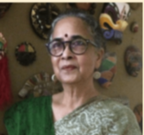Translated from the Bengali by Shamita Das Dasgupta
“Samantha, are you okay?”
“Samantha, are you okay?”
The words chime persistently like an alarm clock. He can see the enormous neem tree through the window. The road beneath it travels to various offices, to the schools, and sometimes, to nowhere. For instance, currently, Siddhesh has no path of his own. He only has a room and a balcony. When he is seated in the balcony, the neem leaves touch him. They might have also touched him if he could stand. But Siddhesh has forgotten what it is like to stand. Of course, he is not bothered about that. A lot has been done to make him comfortable. All ridges on the floor have been removed. Thus, the wheelchair never meets with any obstructions.
It’s true that the wheelchair can roll slickly in a room without sills, but not all movements are smooth. Some are blocked. So, Bonnie has sent him Samantha.
She said, “I’m not with you, so let Samantha be there. She’ll care for you.”
How many people would go to such an extent for an ex-husband?
Siddhesh observes that a bunch of people are leaving the cafeteria next door after their meals. Fancily embroidered on their blue uniforms is the word, ‘Digipak.’ They work in a packaging plant that manufactures shoe-containers in various sizes. He ponders whether these workers are becoming like the cartons they make. Maybe they shed their box-like existence only when they come out to eat.
Glancing at the sated faces of the people, Siddhesh feels a strong urge to get some food from the same shop. A woman and her husband started the eatery nearly twenty years ago. The woman’s name was Namita Biswas. To the neighborhood, she was Namita-di. The canteen became branded as ‘Namita-di’s Kitchen.’ She was a wonderful cook. Good cooks abound everywhere, but Namita-di had an exceptional sense of culinary restraint. Using small amounts of oil and spices, she used to lift ordinary dishes to new heights. She was particularly known for her snacks and vegetarian dishes. The prices were quite low also. When a guest appeared in someone’s home unannounced, or a household quit cooking for a day, they got food from Namita-di’s Kitchen. How many times had Ma sent Siddhesh to do the same?
Years ago, the whole process of food-making was visible from the balcony. The neem tree was a teenager then. But not anymore. As food was being made ready there, Siddhesh would watch from here. He used to be fascinated by the liveliness in people’s consumption – asking for a bit more gravy, one more green chili, licking the plate when the food was devoured. He had viewed all this with great interest.
When Namita-di had carefully filled the tiffin-box he brought and handed it back, she never forgot to wrap a bit of freshly fried food in paper for him. An eggplant slice, crispy potatoes fried with peanuts, or a piece of sautéed fish-roe. And if he had gone in the evenings, a deviled egg, or a bread pakora.[i] Siddhesh believed, the people who ate there got something more besides food. Then Siddhesh left the country to study abroad. He studied, worked, entered a relationship, came out of it. When he returned in intervals of three of four years, he didn’t have time to check out the cafeteria. Only once, as he ate and exclaimed at a wonderfully delicious dish, Ma said, “Couldn’t you guess? It’s plantain kofta. I got it from Namita-di’s kitchen. You must remember how much you loved it!”
No, he couldn’t recollect. Not his love for green plantain kofta, nor Namita-di’s countenance.
Now his tongue recalls all those forgotten tastes. Now he craves those flavors one more time. Crunchy fried potato with peanuts, bread pakora, deviled eggs, plantain kofta. He hasn’t taken out any food from the canteen since Ma passed away. Bonnie also used to bring home food. No breakfast, as he got up late. After coffee, she would order lots of pizza for lunch and Chinese in the evenings.
At that time, after ending plenty of relationships and several jobs in Houston, he had returned home to marry his old flame, Bonnie. He presumed he could settle down with Bonnie since she was from Kolkata. But the Kolkata he had left and the one he returned to were not the same. He kept losing his directions on the streets. The numerous flyovers recently erected had transformed the familiar city. Bonnie, too, was no longer the Presidency college girl with a glowing face and sweat plastered hair. Her first marriage had been wrecked and instead of teaching at a college, she was making documentary films. Once he had married Bonnie on an impulse, he realized that this was not the Bonnie he knew. Still, it was fine. But suddenly, the nerves from his waist to his toes began to wither. Bonnie received a lucrative offer from California – an interesting project. What could she have done other than accept it?
She had arrived in Siddhesh’s life when the last link to his birth-family, his Ma, had expired. He was quite alone. Their newly established family was without borders or controls – in eating, sleeping, going out, or returning home. They didn’t operate under rules that other couples followed. This couldn’t have happened if Ma had been there. Once he thought, they were avoiding the frictions that would’ve been inevitable if Ma were there. Now, their life together would move effortlessly. Like his wheelchair in a barrierless room.
Siddhesh decides to go back to his room and turns his wheelchair toward it. There are no obstacles. The floor is nearly empty except for a bed and a desk. There is also a small refrigerator and an alcove with a bookshelf. Everything is accessible to him. The bed and desk are constructed as wheelchair friendly – the toilet too. Bonnie isn’t uncaring. Before she left, she redesigned the room to make life easier for Siddhesh. She wanted to hire a couple of caregivers round the clock, but Siddhesh didn’t agree.
Now, Pushpa comes to cook in the evenings. She leaves a thermos filled with hot tea. In addition, there’s an electric kettle, a coffee maker, and some snacks to munch on. He can even entertain guests here. He can peek through the peephole and open the door by himself. He really can do everything. So, what’s the problem?
As he wheels into the room, Siddhesh thinks that it might have been better to have door sills in the room. If there had been door sills, Bonnie would have stopped at least for an instant.
It is late, he should have some food. The hotpots are full of food. Pushpa understands him. Rarely does he put away leftovers in the fridge. Siddhesh lifts the lids, breathes in the aroma. Khichadi, fried veg, and paneer.[ii] Today, he had wished for this menu. But he loses his appetite as he nears the food. Namita-di used to cook a mixed vegetable curry to go with kichadi, he remembers.
A desire flares in him as soon as he remembers this. He yearns for Samantha. Samantha – with her full body and abundant youth is lying motionless, like congealed honey, on the bed. She is recharging. How much charge does she need? Siddhesh feels vicious as this thought courses through his mind.
He draws his wheelchair near the bed. Samantha is stretched out at the edge of the bed. She is plugged into the nearest switchboard. A scarlet light blinks on her left breast. She is 60 percent charged. She is dressed in a red crop-top blouse and a pair of blue denim shorts. On the blouse are these printed words – “Fucking Mind.”
Siddhesh puts out his arm to rip the blouse off her. Someone murmurs inside him – had he ever had sex with Bonnie when she was menstruating? Samantha was being charged now! At this time… He ignores the voice and forcibly removes the top. Then the shorts. He knows what would ensue. Samantha’s body will twist, her nostrils flare, lips quiver. Her brown nipples would turn pink. She’ll come headfirst toward Siddhesh.
Siddhesh searches for the remote control. Oh shit! Where’s the remote? Ah, there it is inside the book. He is reading “Surely you’re joking, Mr. Feynman?” since yesterday. He had craved for Samantha while he was reading. Samantha is never tired. She doesn’t fuss like Bonnie either. Never refuses with words like ‘leave me, I don’t feel well today,’ or ‘don’t you want anything but my body?’
How strange! It was Bonnie who had sent Samantha. No one understands Siddhesh as well as her. But did Bonnie’s nostrils ever spread when he caressed her? Did her nipples ever change color? Did her navel ever tremble with hushed anticipation? Samantha experiences all these. She plays copybook cricket. Siddhesh can press the remote and let her know the level of pleasure he requires.
He presses level three on the remote. He needs extreme pleasure now.
What’s wrong! Samantha is inactive! She isn’t performing what is necessary. Has her chip turned impervious to the signal? Her naked body looks like a cold corpse – just like Bonnie’s, who used to lay like a dead log under him. Siddhesh burns with rage. He can’t consume Namita-di’s mixed vegetable curry, nor have sex with Samantha. Why? Why so? Siddhesh lands a resounding slap on Samantha’s cheek. Immediately, the mechanical doll, sex-kitten Samantha whacks him right back.
“Don’t you think I have any wishes, Siddhesh? Am I not allowed to have any needs?”
Samantha keeps repeating these lines again and again until, with trembling hands, Siddhesh tears open the lid on her back and disconnects the life-giving CPU.
End Note
[i] A small piece of vegetable or meat dipped in batter and deep fried.
[ii] Paneer is Indian cheese that is made by curdling milk. It is often made into a curry.



























0 Comments